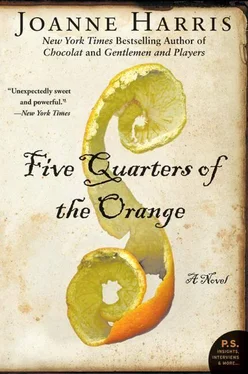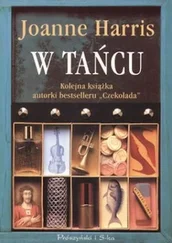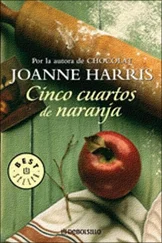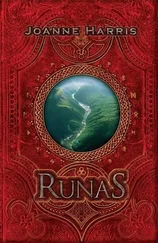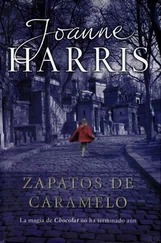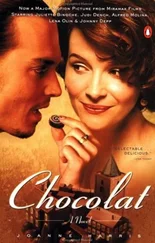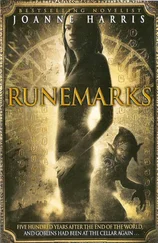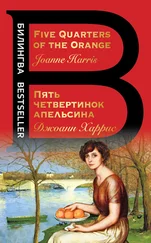I dreamed often of Jeannette Gaudin, of the white gravestone with the angel, white lilies in a vase at the head. Beloved Daughter . Sometimes I awoke with tears on my face, my jaw aching as if I had ground my teeth for hours. Sometimes I awoke confused, certain that I was dying. The water snake had bitten me after all, I told myself woozily. In spite of all my precautions. It had bitten me, but instead of dying quickly-white flowers, marble, tears-it was turning me into my mother. I moaned in my hot half-sleep, holding my shorn head in my hands.
There were times when I used the orange bag out of sheer spite, secret revenge for the dreams. I heard her pacing in her room, sometimes talking to herself. The morphine jar was almost empty. Once she threw something heavy against the wall and it shattered; later we found the pieces of her mother’s clock in the rubbish, the dome smashed to pieces, the clock face cracked down the middle. I felt no pity. I would have done it myself if I’d dared.
Two things kept me sane through that September. First, my hunt for the pike. I caught several using Tomas’s suggestion of live bait-the Standing Stones were rank with their corpses and the air was a purple shimmer crackling with flies-and though Old Mother remained elusive, I was sure I was getting close. I imagined that for every pike I caught she would be watching, her rage growing, her recklessness growing. The lust for vengeance would claim her at last, I told myself. She could not ignore this attack on her people forever. However patient, however impassive she might be, there would come a time when she would not be able to stop herself. She would come out, she would fight, and I would have her. I persisted, and vented my rage on the corpses of the victims with growing ingenuity, sometimes using what was left as bait for my cray pots.
My second source of comfort was Tomas. We continued to see him weekly, when he could get away on a Thursday, his day off. He came by motorbike (which he hid along with his uniform in the bushes behind the Lookout Post). Strangely enough we had got so used to his visits that his presence alone would have been enough for us, but we hid the fact each in his or her own way. In his presence we changed; Cassis grew nonchalant, showing off with desperate bravado- watch how I can swim the Loire at the fastest point, watch how I steal honeycomb from the wild bees -Reine was kittenish and shy, peeping at him from darkened eyes and pouting her pretty lipsticked mouth. I despised Reine’s posturing. Since I knew I could not compete with my sister at her game, I went out of my way to outdare Cassis in everything he did. I swam across deeper and more dangerous stretches of river. I dived for longer periods of time. I swung from the topmost branches of the Lookout Post, and when Cassis dared to match me, I swung upside down, knowing his secret fear of heights, laughing and screaming apelike at the others below. With my cropped hair I was more boyish than any boy, and already Cassis was beginning to show traces of the softness that would overtake him in middle age. I was tougher and harder than he was. I was too young to understand fear as he did, risking my life gaily in order to steal a march on my brother. I was the one who had invented the Root Game, which was to become one of our favorites, and I spent hours practicing, so that I was almost always the winner.
The principle of the game was simple. Along the banks of the Loire, shrunken now since the end of the rains, grew a profusion of tree roots washed bare by the passage of the river. Some were thick as a girl’s waist, others were mere fingerlings drooping down into the current, often reattaching themselves to the yellow soil a meter or so underwater so that they formed loops of woody matter in the murky water. The object of the game was to dive through these loops-some of them very tight-jackknifing the body abruptly down and through and back again. If you missed the loop first time in the murky dark water, or resurfaced without having gone through, or if you refused a dare, then you were out. The person who could do the most loops, without missing any, won.
It was a dangerous game. The root loops always occurred at the fastest parts of the river, where the banks were steeply eroded by the water’s passage. Snakes lived in the hollows under the roots, and if the bank collapsed it was possible to remain trapped under the fallen soil. The way under was virtually invisible, and you had to grope underneath the rootlets for the way out. It was always a possibility that someone might get caught, jammed in place by the savage current until he or she drowned, but this, of course, was the game’s beauty and its appeal.
I was very good at it. Reine seldom played-she was driven frequently to hysterics as we competed to impress-but Cassis could never refuse a challenge. He was still stronger than I was, but I had the advantage of the slighter build and the more supple spine. I was an eel, and the more Cassis bragged and postured, the stiffer he grew. I don’t remember ever losing.
The only chance I had of seeing Tomas alone was if both Cassis and Reine misbehaved at school. If this happened, they would be kept back on Thursday after the rest had left, sitting at their little desks in the detention hall, conjugating verbs or writing lines. It occurred rarely as a rule, but this was a difficult time for everyone. The school was still occupied. Teachers were scarce, and classes might run to fifty or sixty pupils at once. Patiences were worn thin; any little thing might do it. A word spoken out of turn, a bad test result, a playground fight, a forgotten lesson. I prayed for it to happen.
The day it did was unique. I remember it as clearly as some dreams, a memory more colored and more defined than the rest, a perfect transparency among the blurry and uncertain events of that summer. For a single day everything turned in perfect synchronicity, and for the first time since I could remember I felt a kind of tranquillity, a peace with myself and with my world, a feeling that, if I chose, I could make this perfect day last forever. It is a feeling I have never quite regained, though I thought I felt something a little like it on each of the days my daughters were born, and perhaps again once or twice with Hervé or when a dish I was cooking turned out just exactly right; but this was the real thing, the elixir, the never-to-be-forgotten.
Mother had been ill the evening before. Not my doing, this time-the orange bag was useless, having been heated up so often in the past month that the peel was blackened and charred, its smell barely perceptible. No, this was just one of her usual bad spells, and after a while she took her pills and went to bed, leaving me to my own devices. I awoke early and took off to the river before Cassis and Reine were awake. It was one of those red-gold early October days, the air crisp and tart and heady as applejack, and even at dawn the sky was the clear, purplish blue that only the finest of autumn days brings. There are maybe three such days in a year. I sang as I lifted my traps, and my voice bounced off the misty banks of the Loire like a challenge. It was the mushroom season, so after I had brought my catch back to the farm and cleaned it out, I took some bread and cheese for breakfast and set out into the woods to hunt for mushrooms. I was always good at that. Still am, to tell the truth, but in those days I had a nose like a truffle pig’s. I could smell those mushrooms out, the gray chanterelle and the orange, with its apricot scent, the bolet and the petit rose and the edible puffball and the brown-cap and the blue-cap. Mother always told us to take our mushrooms to the pharmacy to ensure we had not gathered anything poisonous, but I never made a mistake. I knew the meaty scent of the bolet and the dry, earthy smell of the brown-cap mushroom. I knew their haunts and their breeding grounds. I was a patient collector.
Читать дальше
